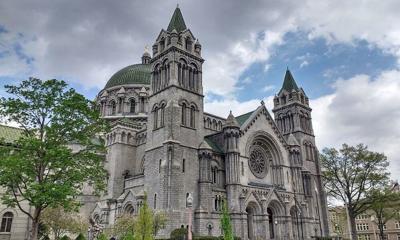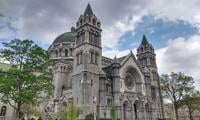
Cathedral Basilica of Saint Louis
ST. LOUIS — An appeals court has reversed a trial court’s grant of summary judgment that had barred a man from pursuing claims that a priest sexually abused him as a child and that the Archdiocese of St. Louis intentionally failed to supervise clergy.
The Missouri Court of Appeals, Eastern District held John J.P. Doe’s cause of action did not accrue until he recovered repressed memories of the alleged abuse in 2016, years after two separate Chapter 7 bankruptcy filings in 2008 and 2009, and therefore the claims were not part of his bankruptcy estate and Doe has standing to pursue them.
The opinion, authored by Presiding Judge Michael S. Wright and joined by Judges Philip M. Hess and Virginia W. Lay, reverses the trial court’s judgment and remands the case for further proceedings consistent with the opinion.
Doe filed the underlying lawsuit on Aug. 25, 2022, asserting nine counts, including childhood sexual abuse and intentional failure to supervise clergy, along with claims for civil conspiracy, breach of special relationship or duty, fraud, constructive fraud, intentional infliction of emotional distress and negligence.
The petition alleges that in the late 1980s, Doe lived at St. Joseph’s Home for Boys, a Catholic residential home associated with the Archdiocese of St. Louis, and that Father Alexander Anderson, a priest assigned to the home as a counselor, sexually abused him during that time.
The petition further alleges Doe reported the abuse at the time but that no action was taken and that he repressed his memory of the abuse until 2016.
The respondents, Anderson and the Archdiocese of St. Louis, initially moved to dismiss several counts for failure to state a claim and the trial court granted dismissal as to seven counts, leaving the childhood-sex-abuse and intentional-failure-to-supervise claims.
The respondents then moved for summary judgment on those remaining claims, arguing Doe lacked standing because any cause of action arising from events in the 1980s became property of Doe’s bankruptcy estate when he filed Chapter 7 petitions in 2008 and again in 2009, and he failed to list the cause of action as an exempt asset on bankruptcy schedules.
The summary judgment record showed Doe’s first Chapter 7 petition in the United States Bankruptcy Court for the Eastern District of Missouri was filed in 2008 and closed the same year; he filed again in 2009 and received a discharge with a final decree in 2010.
Trustees were appointed in both bankruptcy matters.
Doe opposed summary judgment, asserting that because his memories of the abuse were repressed and were not recovered until 2016, his cause of action did not accrue until that later date and therefore was not property of the bankruptcy estate.
The trial court nevertheless granted summary judgment in favor of Respondents, prompting Doe’s appeal.
On review, the appeals court noted that questions of standing must be resolved before merits-based dispositions and noted precedent that a court should dismiss for lack of standing rather than enter merits-based summary judgment.
The court concluded Doe’s cause of action accrued when he recovered his memory in 2016, and because that accrual date postdated Doe’s bankruptcy filings, the panel held the cause of action was not part of the bankruptcy estate and Doe, not a bankruptcy trustee, has standing to pursue the claims.
The appeals court then reversed the trial court’s grant of summary judgment and remanded the case for further proceedings consistent with its opinion.
Missouri Court of Appeals, Eastern District case number: ED112916






